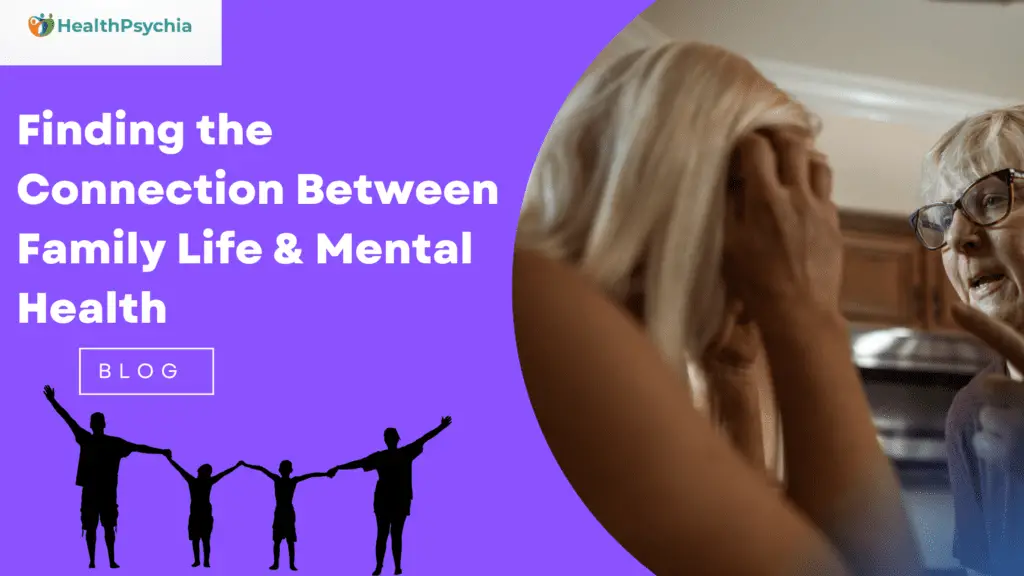Family life plays a significant role in an individual’s biopsychosocial growth. Our families are the first set of people we learn how to socialize with.
We observe their behavior and adopt them. Our perception of what is considered normal and healthy is defined by them.
From the earliest age, they become the standard of life for us, which we tirelessly attempt to follow. Hence, family life significantly impacts our emotional and mental health.
In most cases, individuals diagnosed with mental health disorders tend to have childhood trauma, whether it is in the form of abuse, neglect, or unhealthy behavioral patterns.
In this article, we will discover how family life today can positively or negatively impact the couple or children.
Correlation Between Family Life & Mental Health
Mental health during childhood is defined as achieving developmental and emotional milestones. A child needs to learn how to walk by the age of 1.5 years.
If they can do so, one would assume that their development is linear with their health. However, if a child cannot do so, it would raise concern for their physical and mental health.
Family life today is imperative in developing our bodies, mindsets, perspective, emotional understanding, and social relations.
They can make or break our developmental stages and often set the motion for the rest of our life.
Family Life-Abuse and Neglect
To understand the correlation better, we can talk about childhood trauma from abuse and neglect.
Abuse would be defined as physically hitting the child, emotionally ridiculing them, or taking away their rights to basic needs such as food and sleep as punishment.
Neglect would be defined as the lack of care for the child, whether in terms of being irresponsible about the child’s physical needs or not providing them with the love and comfort they require to grow emotionally healthy.
Suppose individual experiences this in their early developmental stages.
In that case, their childhood trauma will cause them to become emotionally unavailable, abusive to others, develop self-harming behaviors, suffer from mental health disorders, and many other harmful habits.
Family Life -Love and Care
Children who grow up in loving and caring households where their parents are present- emotionally and physically- tend to become far more successful.
They perform better at school, view life situations more positively, and have healthy relationships with their family, friends, and peers.
They are also likely to be more intelligent, creative, and have curious personalities. They are eager to learn more.
The difference between the two is just one element- childhood trauma. Lack of childhood trauma gives the child an endless opportunity to grow, learn, and develop as they will.
But childhood trauma forces the child to focus on their survival more than their development.

Family Life -Positive Mental Health Impacts
Families play the role of a guide in how life should be spent. From the most minute of habits to more significant reactions, they set a notion for children to follow.
If done correctly, here are some positive effects of healthy family life or parenting;
1- Improves Mental Health
Spending time with your family is an excellent method of improving our mental health.
When we communicate face-to-face and spend quality time together, giving each other our attention and love, we develop healthy emotional connections.
These connections prevent the development of depression, anxiety, or other mental health disorders and help us feel supported and cared for.
2- Lowers Risk Of Behavioral Problems
Children who spend more time with their parents tend to have a decreased desire to portray negative behaviors. When children receive positive attention from their parents for their excellent behavior, they repeat it more often to receive praise.
They also tend to feel more comfortable sharing their mistakes with their parents because they trust them to provide positive coping solutions.
However, lacking it can push a child into developing negative behaviors such as substance abuse, violence, bullying, and more.
3- Boosts Self-Confidence And Reduces Stress
Spending time with family helps children develop skills that can help them in the long run, such as communication skills, problem-solving, coping mechanisms, and more.
This helps boost their confidence because they know they can handle any situation. They also feel less stressed because they already equip the healthy coping mechanisms required to maintain it.
So they opt for running or napping over drinking alcohol or partying.
4- Healthy Conflict Resolution
Family life today is not devoid of conflict arising. Many families have strong-headed individuals with varying opinions which can cause issues when forming a mutual decision.
However, a healthy family works together to create a solution that makes everyone happy. Through constructive communication, they discuss, debate, and solve problems.
Children who learn this skill from a young age implement it in all the other relationships in their life, helping them maintain long-term connections.
5- Develop Resilience And Adaptability
A healthy familial relationship improves your capacity to deal with life’s transitions and hardships.
Connecting with family offers you the sense that you belong, are cared for, and are needed, which provides a sense of purpose and meaning. This certainty motivates you to keep going, improve, and achieve.
Family Life-Negative Mental Health Impacts
The negative impacts of family life today have been discussed multiple times throughout this article.
An unhealthy family’s most significant negative consequence is childhood trauma and mental health disorders.
1- Increases Risk Of Mental Health Disorders
Individuals from unhealthy families are at a greater risk of developing depression, anxiety, personality disorders, bipolar disorder, and behavioral problems.
This is an effect of the lack of attention, care, and love they received as a child.
They lack self-esteem, do not understand boundaries, and lack healthy coping mechanisms pushes them into relying on unhealthy habits such as drug usage or self-harm.

2- Repetition Of Negative Behavioral Patterns
When children grow up watching their parents be abusive towards each other or the child, they normalize the behavior.
Instead of focusing on overcoming their childhood trauma, they repeat the same negative behavior because they consider it a “normal” reaction.
Hence, the cycle continues, resulting in more mentally unhealthy and suffering individuals.
3- Lack Of Healthy, Supportive Relationships
Individuals coming from broken families have no concept of what a healthy relationship looks like.
They tend to repeat behavioral patterns they observed in their parents.
Hence, they are less likely to maintain relationships and have a supportive environment. What they lack in their childhood, they become unable to hold onto it in adulthood.
How To Help A Loved One Suffering From Mental Health Issues
Mental health issues can arise for many other reasons besides unhealthy family dynamics.
However, it is essential how to care for someone suffering from a mental health issue, whether or not it was caused by family life today.
Helping Your Child
If your child suffers from a mental health disorder, it can be challenging to care for them. They are not always responsive to care or refuse it straight out. But it is important to remember that their reactions likely come from a place of pain rather than hate.
Ensure your child fulfills basic needs such as eating, sleeping, showering, etc. Help them out where they require it, and let them be where they respond negatively.
Remember, your child is also learning to cope with their health to be able to do so alone. Consistently cared for by someone else can be difficult and make you feel too dependent.
Hence, expect frustration or irritation from your child when dealing with their health.
Remind them that they are loved and important. But most importantly, show them how much they mean to you.
Helping Your Parent Or Loved One
Helping others begins with understanding what they are dealing with. If your loved one is suffering from depression, learn the symptoms of depression and keep an eye out for any signs that they might start repeating consistently.
For example, it might be time for an intervention if they sleep more than usual. Find ways to help them out without making them feel dependent.
Coming up with excuses to leave the house, go on walks, run errands, or even go to the bookstore will urge them to complete a task that will instantly make them feel better. Give them the nudge they need to feel better, and they will care for themselves.
Conclusion
Don’t forget to take care of yourself. Helping others can take a toll on our emotional and mental health. If you continue to push yourself through these difficulties, you might suffer from these mental health disorders.
Then, you won’t be of use to yourself or others. Mental health disorders can be daunting, but recovery is always possible. Reach out and get help today.


